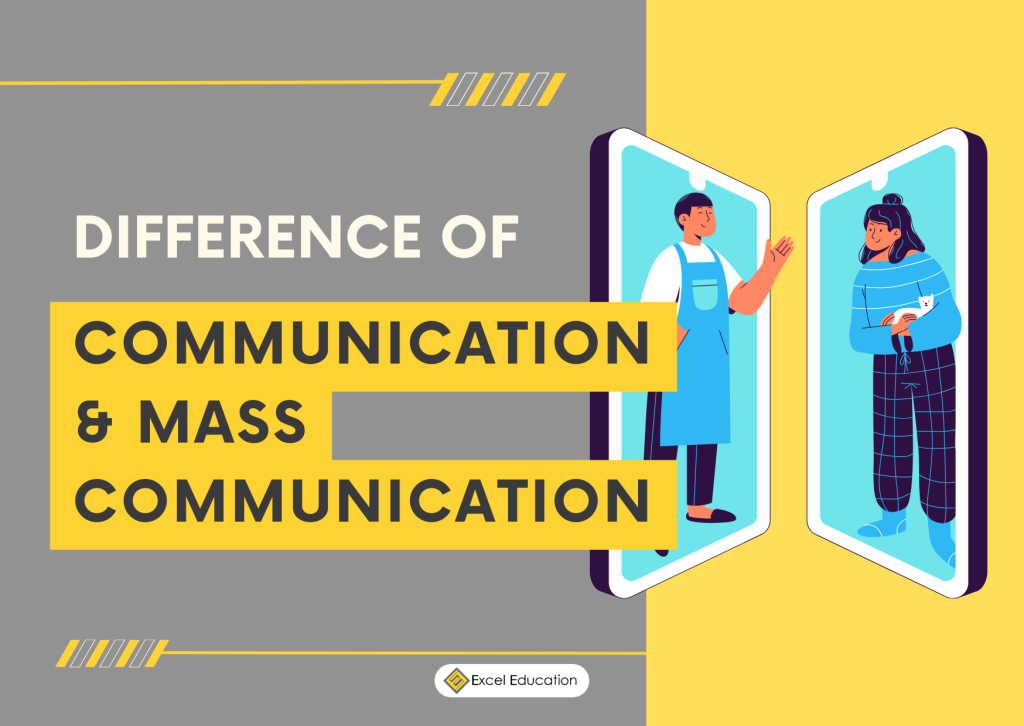
We live in a time of connectivity, where communication is vital in ensuring accurate information is delivered to the masses. You’ll listen to a politician’s speech on TV and wonder how are they so articulate? Well, that’s thanks to script writers working hard in the Communication or even, Mass Communication degree field. Searching for the difference between Communication and Mass Communication? You’re in the right place!
What is Communication?

As a general definition, Communication is said to be the act of exchanging ideas or information. This act can be done in many ways, verbally, or through various other forms of media. Communication can involve individuals in a one-on-one interaction or an interaction between groups of people.
Communication is an integral aspect to life. Even in the context of business or corporations, Communication is not an option, it’s a necessity. In fact, Communication is one of the most valuable soft skills to have. The use of strategic, authentic, or skillful Communication is essential no matter the industry.
Additionally, Communication is a very dynamic and broad field encompassing many other fields. With a Communication degree, graduates will develop highly transferable skill sets, boosting their employability. Also, Communication graduates have varied and diverse career opportunities, allowing them to experience interdisciplinary fields.
What is Mass Communication?
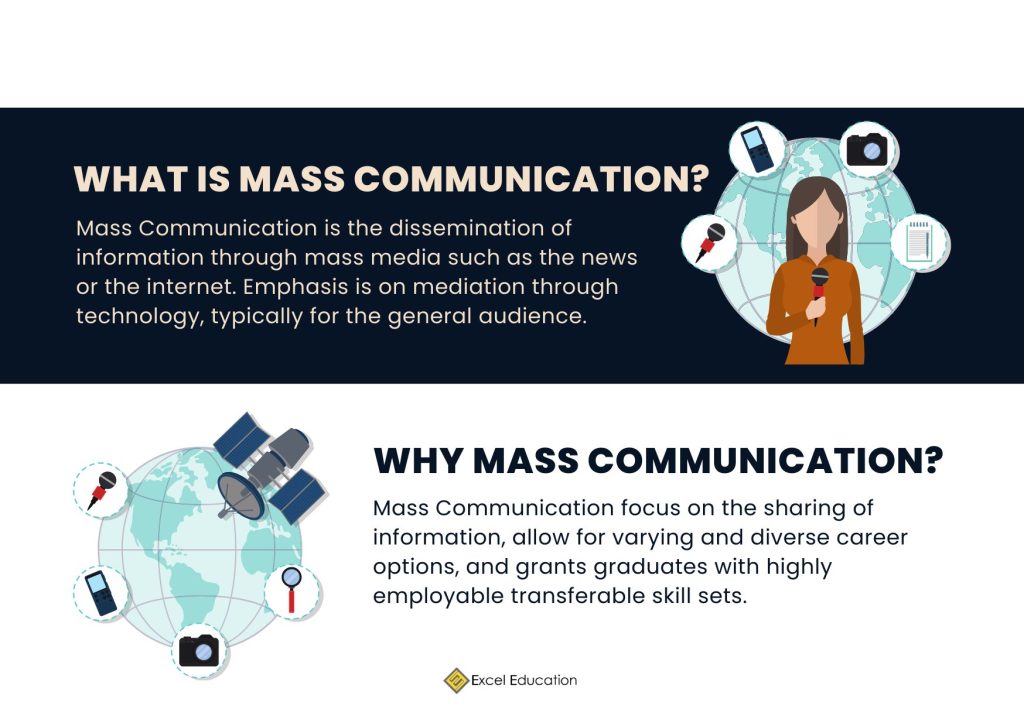
On the other hand, Mass Communication is defined as the dissemination of information through mass media such as the television, the news, or the internet. For the field of Mass Communication, or Mass Comm, the emphasis is on how information is mediated through the use of technology, typically for the general audience or large groups of people.
Mass Communication degree is a more narrow field falling under Communication. In the context of Australia, Mass Communication degree is usually offered to students as a major instead of a whole degree. Instead, Mass Communication degree is found to be named with other alternative titles like Media Communication degree. Though in Malaysia, Mass Communication degree is commonly offered as a whole.
There is a very fine line of difference between Communication and Mass Communication but their similarities include that they focus on the sharing of information, allow for varying career options, and grants graduates with highly employable transferable skills.
Difference between Communication and Mass Communication
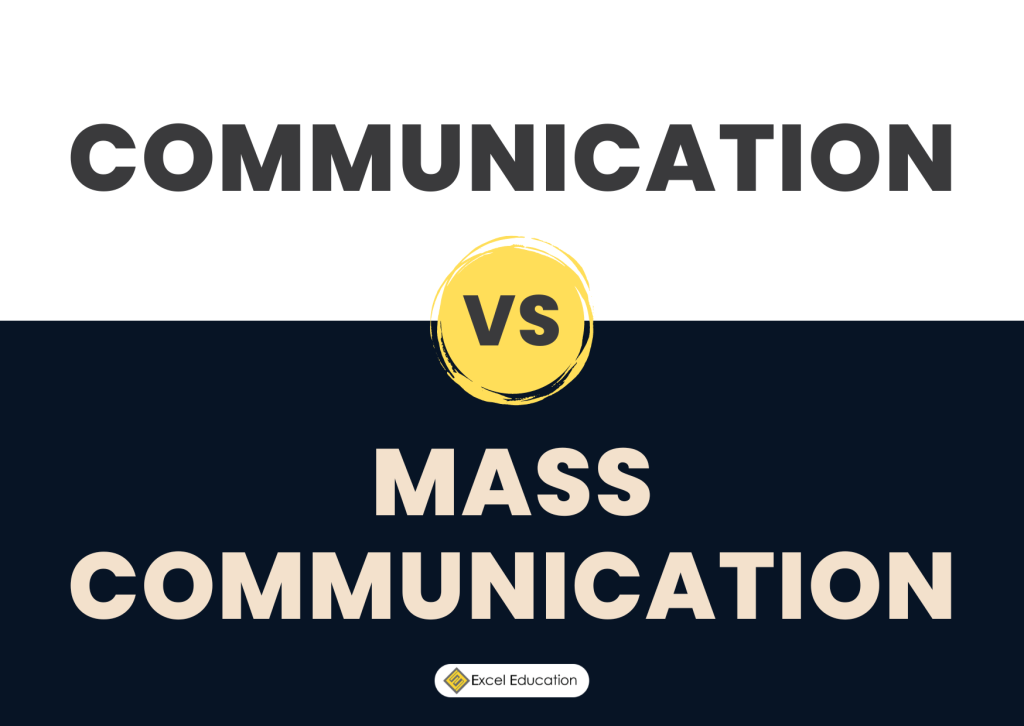
Communication | Aspect | Mass Communication |
Typically uncontrolled and informal within an audience reach which is smaller in comparison. | Nature | Typically controlled within an audience reach which is larger or more public and general. |
Communication is essential in effectively conveying information either between individuals, between organisations or between organisations and the public. | Purpose | The purpose of Mass Communication is to create narratives or accomplish goals through dissemination of messages in a way that is ethical and effective. |
Ranging from being highly personal without much structure and vice versa. | Content | More structured, tailored, and standardised with less room for content to be personalised. |
Feedback is more receptive. It is more interactive with faster and more immediate response or exchange of information. | Feedback | Feedback is limited. Commonly done through one-way interactions with a smaller chance for the exchange of information. |
Originated from human evolution and the need to convey thoughts. | Root Origin | Originated from development of technological advancements. |
Career Opportunities with Communications Degree
A degree in Communications opens up many career opportunities across diverse fields. What’s more, most, if not all, corporations and businesses will have a Communication department designed to help improve their brand, focus, or advertising strategies. Depending on personal interests, you can pursue these careers:
- Copywriter
- Communications Specialist
- Journalist
- Cross-cultural Worker
- Digital Marketer
- Editor
- Editorial Assistant
- Publisher
- Public Relations Manager
- Marketing Communications Strategist
- Associate Brand Manager
Salaries can vary based on location, type of industry, years of experience, or study level, but listed below are some examples of average annual salaries for different professions in Australia. These salaries can be different depending on which state you plan to work in.
For a copywriter, an average annual salary ranges from $70,000 to $85,000.
An editor makes an average annual salary ranging from $85,000 to $105,000.
A communications specialist has an average annual salary of $90,000 to $110,000.
General Entry Requirements to Study Communications Degree in Australia
Academic Entry
Academic Entry | Minimum Score |
STPM | Aggregate of 7 (Best 3 or 4 Subjects out of a Possible 5 Subjects) |
Matriculation | CGPA 2.20 |
A-Levels | Aggregate of 8 (Min. 3 Subjects) |
UEC | Aggregate of 5 (Best 5 Subjects) |
IB Diploma | 24 |
Australian Matriculation (ATAR) | 50 |
Canadian Pre-University (CPU) | 60 |
Note: Universities may have different requirements. To learn more, get in touch with us!
English Language Entry Requirements
Entry Level | Minimum Score |
IELTS | 6.0 |
TOEFL | 64 |
Pearson Test of English (PTE) | 50 |
Note: Universities may have different requirements. To learn more, get in touch with us!
Common Pathway for Communications Degree Holder
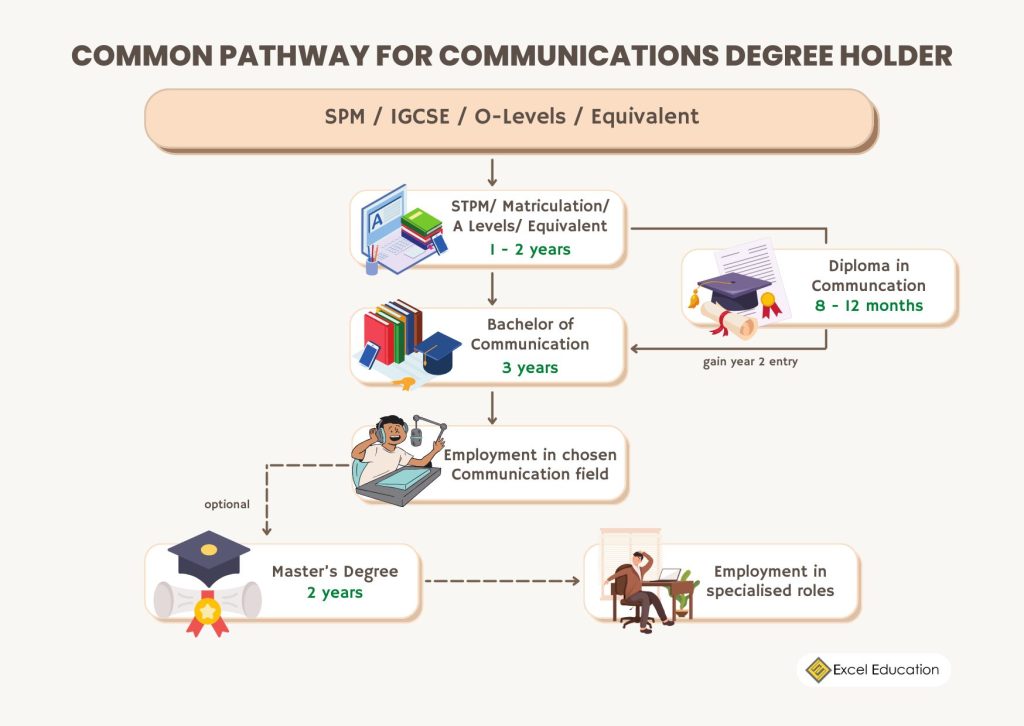
Pathways for a Communications degree holder may vary depending on personal interests and chosen field but generally:
First, pass SPM or equivalent examinations which enable you into a relevant pre-university or study programme.
Second, pass the pre-university or study programme noting any requirements needed to enrol into a Bachelor of Communication in Australia. You can also opt to study a Diploma in Communication for a duration or 8 to 12 months and gain entry into the 2nd year of a Bachelor Degree.
Third, enrol and complete the Bachelor of Communication. Internships, volunteering, or other work experiences in the field you want to professionally pursue are highly recommended.
Finally, you are qualified for employment in entry-level roles where you can gradually progress your career.
Optionally, you can enrol in a Master’s Degree of a specialised Communication field and get employed in more specialised roles.
Best Universities to Study Communications in Australia
1. University of Technology Sydney
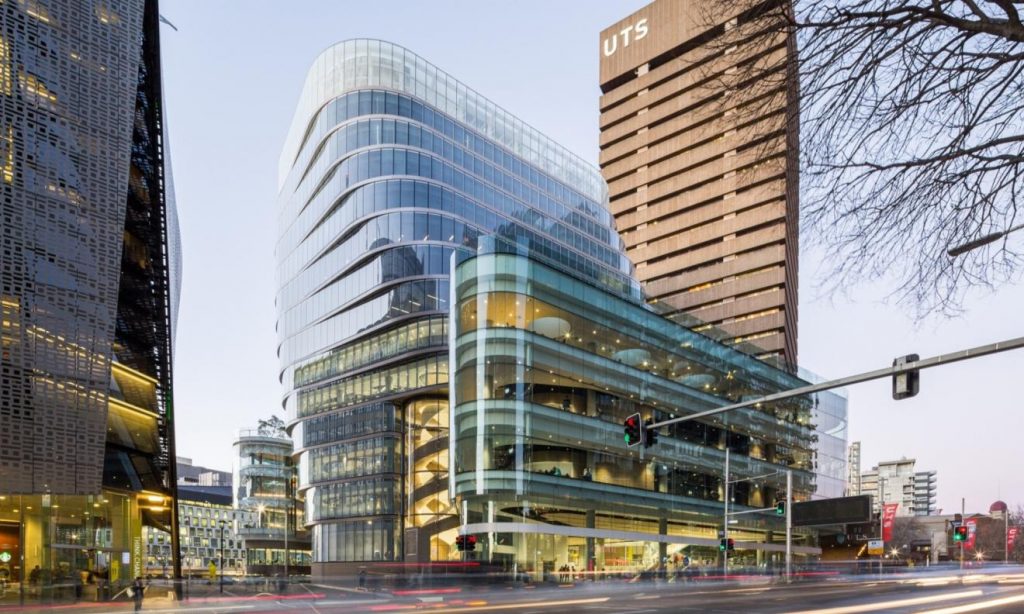
The University of Technology Sydney, widely called as UTS, is a leading public university in Australia. With a history traced back to the 1870s, UTS has currently developed commendable academic excellence proven through being ranked in the top 10 amongst Australian universities.
The Bachelor of Communication at the University of Technology Sydney offers seven majors, where students have the option to choose two majors out of the choices. The course permits skill development, creative explorations, with chances to build a professional portfolio through an internship programme. What’s more, a big named alumni of a UTS Communication degree is the actor Hugh Jackman.
Programme Offered | Bachelor of Communication Major Options:
|
Duration | 3 Years |
Intake | February, July |
Indicative Fees (2024) | International Students: AU$121,248 – AU$139,392 |
Disclaimer: Intake for the Media Arts and Production major is only in February.
Contact us right now for a free consultation if you’d like more details about the costs, the format of the programme, and the entry requirements!
2. Macquarie University

Macquarie University, founded in 1964, is a notable public higher education learning institution located in Sydney, Australia. With five faculties offering a range of undergraduate courses and a ranking at the 11th spot among Australian universities, Macquarie is a suitable choice for those interested in studying a Communication degree.
In the Bachelor of Media and Communications by Macquarie University, students can choose from five major options, aimed for graduates to be equipped with skills fitting for the rapidly evolving field of Communication. Students have access to industry-standard facilities, opportunities for a media internship, as well as the chance to learn from experienced professionals of the field.
Programme Offered | Bachelor of Media and Communications Major Options:
|
Duration | 3 Years |
Intake | February, July |
Indicative Fees (2024) | International Students: AU$113,700 |
Contact us right now for a free consultation if you’d like more details about the costs, the format of the programme, and the entry requirements!
3. Swinburne University of Technology

The Swinburne University of Technology is a public research university based in Melbourne, Australia. Swinburne, established in 1908, is placed in the top 20 amongst Australian universities in the year of 2024, showing their dedication to providing transformative learning experiences.
The Swinburne University of Technology has a Bachelor of Media and Communication programme for those interested. Swinburne’s Communication programme incorporates work-integrated learning, cutting-edge facilities, alongside curriculum with the knowledge in indigenous, local, and global contexts to prepare students in pioneering digital transformation of media industries.
Programme Offered | Bachelor of Media and Communication Major Options:
|
Duration | 3 Years |
Intake | February, July |
Indicative Fees (2024) | International Students: AU$111,720 |
Contact us right now for a free consultation if you’d like more details about the costs, the format of the programme, and the entry requirements!
4. Deakin University
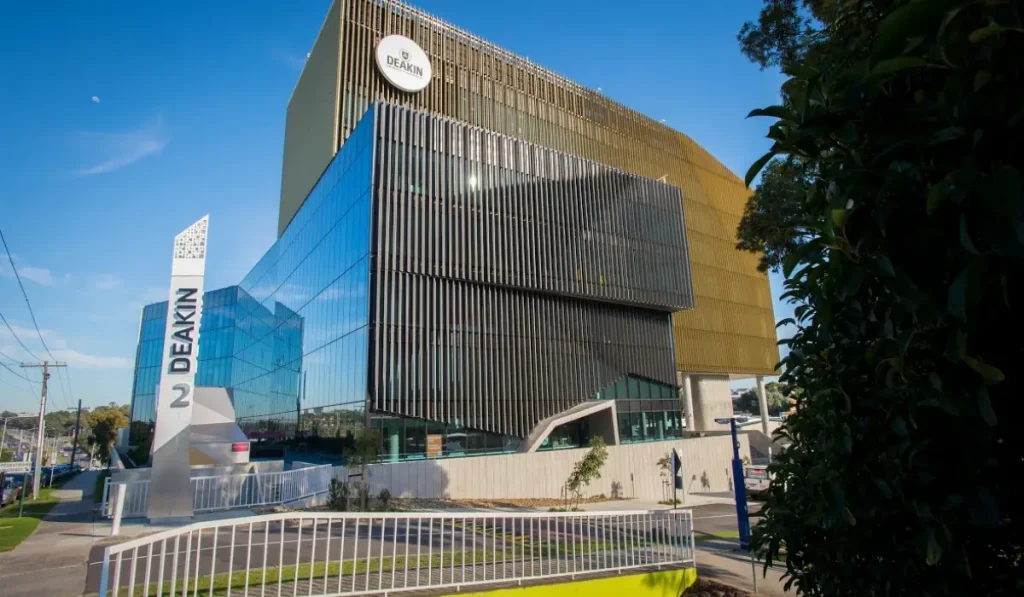
Deakin University, initiated in 1974, is a public tertiary education learning institution named after Australia’s second prime minister, Alfred Deakin. Deakin is a compelling study destination choice considering their ranks in the top 20 amongst Australian universities as well as their comparatively affordable fee.
Deakin University offers the Bachelor of Communication programme with four major options for those looking to academically pursue Communication. Students will learn the craft of creating content across print, digital, audio, and video platforms. Learning is done through a combination of practical assessments, industry events, and internship opportunities, ensuring graduates have a strong work portfolio with appropriate skill sets.
Programme Offered | Bachelor of Communication Major Options:
|
Duration | 3 Years |
Intake | March, July, November |
Indicative Fees (2024) | International Students: AU$106,200 |
Contact us right now for a free consultation if you’d like more details about the costs, the format of the programme, and the entry requirements!
5. Western Sydney University
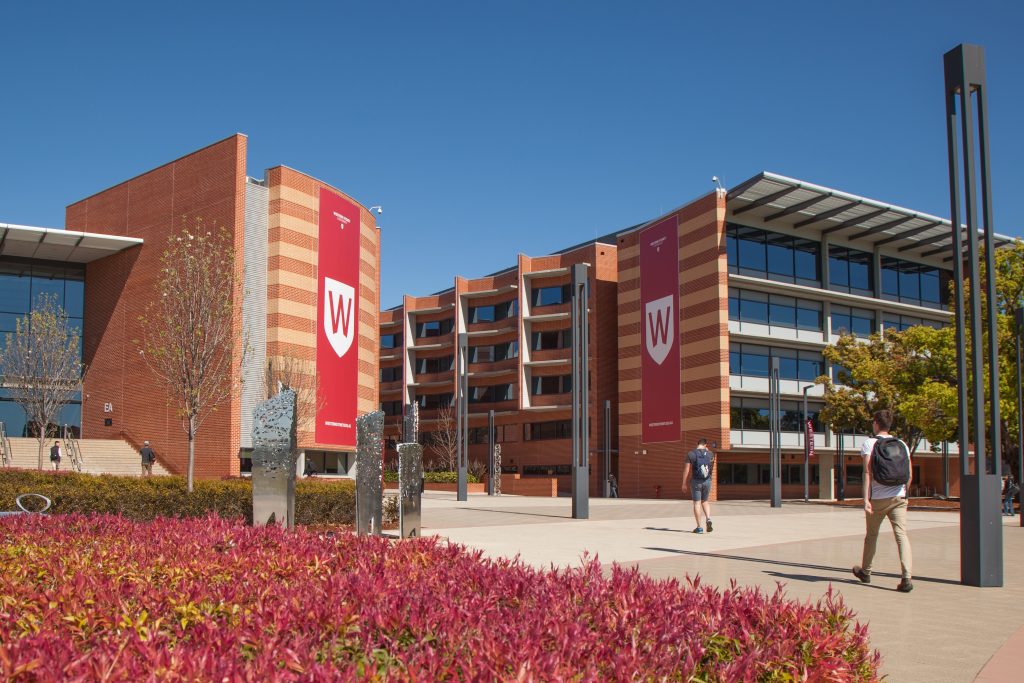
Western Sydney University, abbreviated as WSU, is a multi-campus Australian public research university founded in 1989. WSU is placed amongst the top 25 Australian universities with a developing international reach and growing academic excellence. The university is a great choice for those wanting to study Communication in Australia at a comparatively affordable price point.
The Bachelor of Communication offered at the Western Sydney University offers four major options to prospective students after a first year learning the fundamentals of Communication. Students will also have opportunities for learning with expert industry partners, hands-on learning experiences, and study abroad programmes.
Programme Offered | Bachelor of Communication Major Options:
|
Duration | 3 Years |
Intake | March, July |
Indicative Fees (2024) | International Students: AU$92,880 |
Contact us right now for a free consultation if you’d like more details about the costs, the format of the programme, and the entry requirements!
For more information regarding the university, programmes offered, entry requirements and fees, contact Excel Education.
Recommended Articles to Read
Contact us to find out more!
Student enquiries:
Call/ WhatsApp: +60162206607
Email: [email protected]
For more stories like this, join the Excel Education community on Facebook or follow us on Instagram
Need help with your university application? Connect with us here
About The Author

Hannah Hir
Hannah appreciates various art forms, especially Asian literature, film and music. Most of her favorite Malaysian kuihs are green-coloured.

